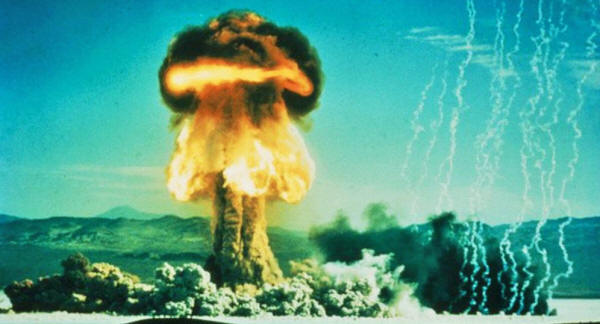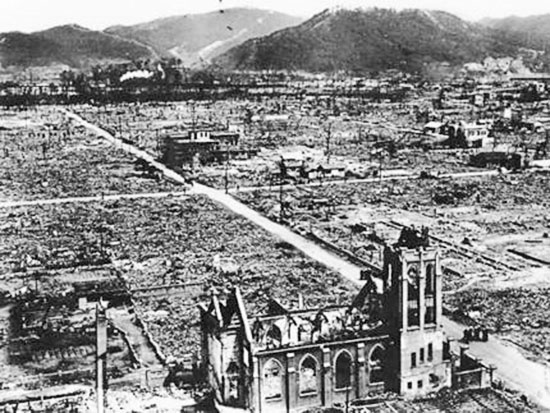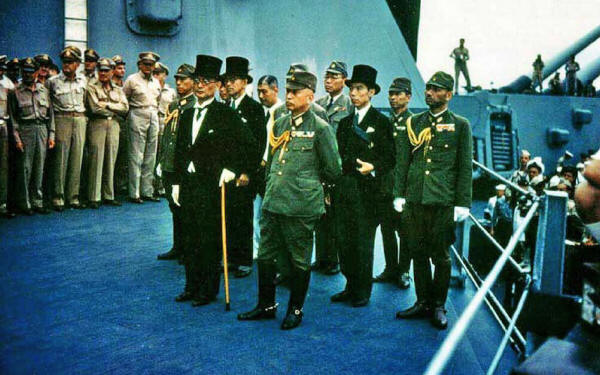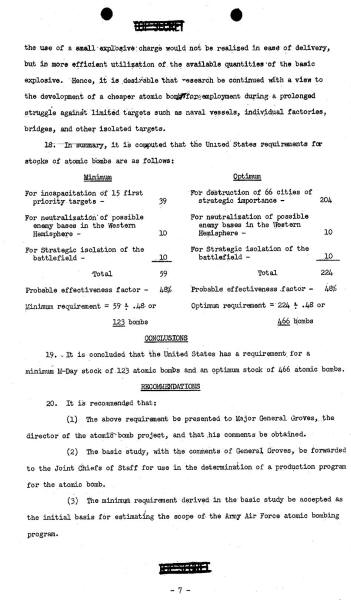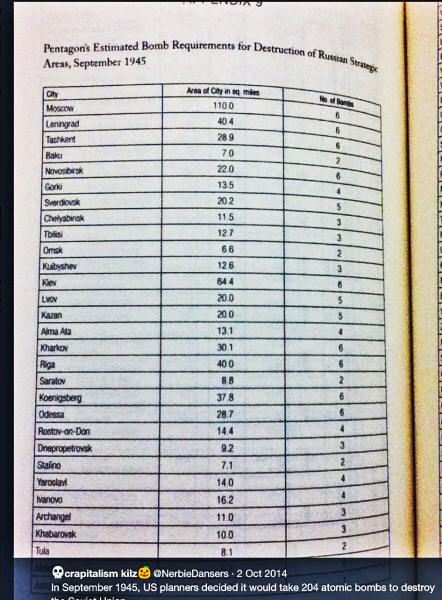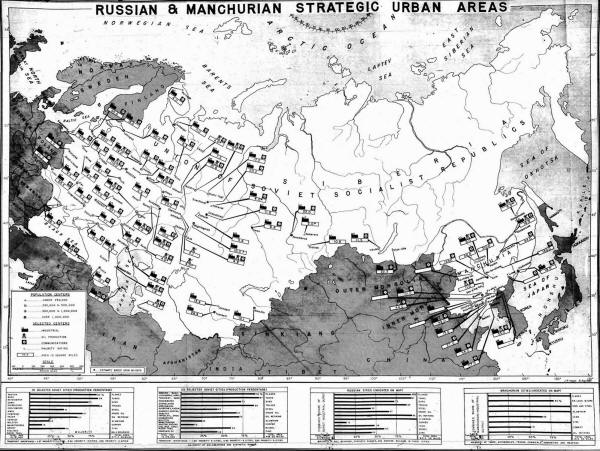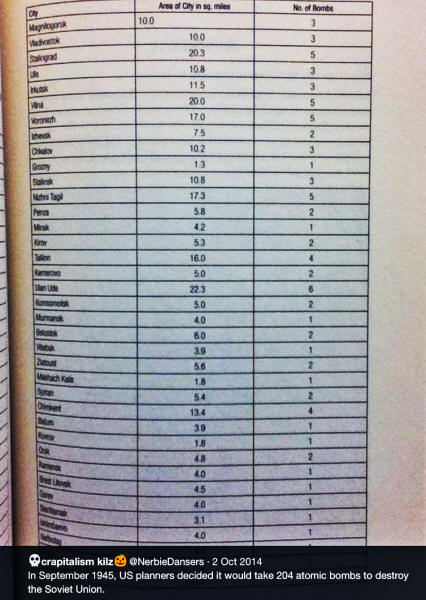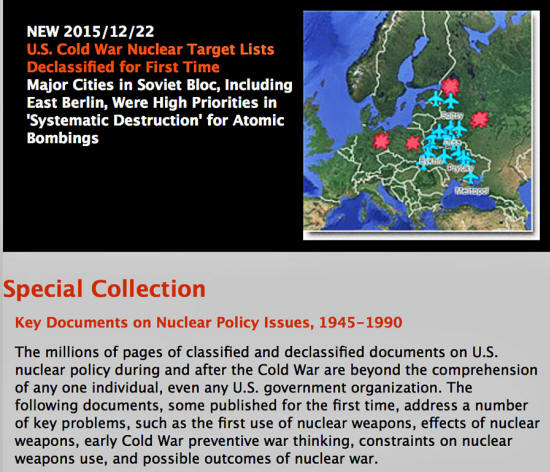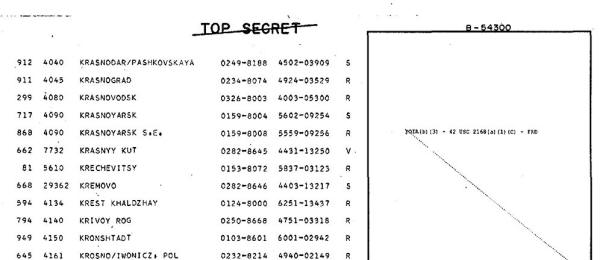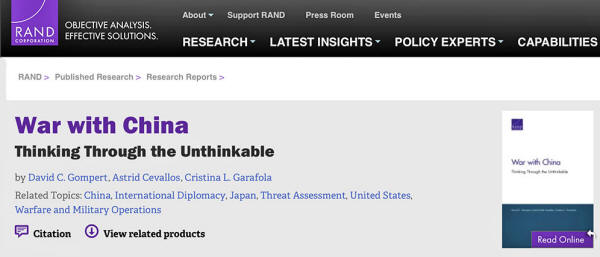|
204 Atomic Bombs against 66 Major Cities
when America and the Soviet
Union were 'Allies'
According to a secret document dated September 15, 1945, "the Pentagon had envisaged blowing up the Soviet Union with a coordinated nuclear attack directed against major urban areas."
All major cities of the Soviet Union were included in the list of 66 "strategic" targets.
The tables below categorize each city in terms of area in square miles and the corresponding number of atomic bombs required to annihilate and kill the inhabitants of selected urban areas.
Six atomic bombs were to be used to destroy each of the larger cities including,
The Pentagon estimated that a total of 204 bombs would be required to "Wipe the Soviet Union off the Map".
The targets for a nuclear attack consisted of sixty-six major cities. One single atomic bomb dropped on Hiroshima resulted in the immediate death of 100,000 people in the first seven seconds.
Imagine what would have happened if 204 atomic bombs had been dropped on major cities of the Soviet Union as outlined in a secret U.S. plan formulated during the Second World War.
Hiroshima in the wake of the atomic bomb attack,
6 August 1945
The document outlining this diabolical military agenda had been released in September 1945, barely one month after the bombing of Hiroshima and Nagasaki (6 and 9 August, 1945) and two years before the onset of the Cold War (1947).
The secret plan dated September 15, 1945 (two weeks after the surrender of Japan on September 2, 1945 aboard the USS Missouri - image below), however, had been formulated at an earlier period, namely at the height of World War II, at a time when America and the Soviet Union were close allies.
It is worth noting that Stalin was first informed through official channels by Harry Truman of the infamous Manhattan Project at the Potsdam Conference on July 24, 1945, barely two weeks before the attack on Hiroshima.
The Manhattan project was launched in 1939, two years prior to America's entry into World War II in December 1941. The Kremlin was fully aware of the secret Manhattan project as early as 1942.
Were the August 1945 Hiroshima and Nagasaki attacks used by the Pentagon to evaluate the viability of a much larger attack on the Soviet Union consisting of more than 204 atomic bombs?
The key documents to bomb 66 cities of the Soviet Union (15 September 1945) were finalized 5-6 weeks after the Hiroshima and Nagasaki bombings (6, 9 August 1945):
The Kremlin was aware of the 1945 plan to bomb sixty-six Soviet cities.
The documents confirm that the U.S. was involved in the "planning of genocide" against the Soviet Union.
Moreover, central to our understanding of the Cold War which started in 1947, Washington's September 1945 plan to bomb 66 cities into smithereens played a key role in triggering the nuclear arms race.
The Soviet Union was threatened and developed its own atomic bomb in 1949. While the Kremlin knew about these plans to "Wipe out" the USSR, the broader public was not informed because the documents were of course classified.
Today, neither the 1945 plan to blow up the Soviet Union nor the underlying cause of the nuclear arms race are acknowledged.
The Western media has largely focused its attention on the Cold War U.S.-USSR confrontation. The plan to annihilate the Soviet Union dating back to World War II and the infamous Manhattan project are not mentioned.
Washington's Cold War nuclear plans are invariably presented in response to so-called Soviet threats, when in fact it was the U.S. September 1945 plan to wipe out the Soviet which motivated Moscow to develop its nuclear weapons capabilities.
Had the U.S. decided not to develop nuclear weapons for use against the Soviet Union, the nuclear arms race would not have taken place. Neither The Soviet Union nor the People's Republic of China would have developed nuclear capabilities as a means of "Deterrence".
The Soviet Union lost 26 million people during World War II.
The USSR developed its own atomic bomb in 1949, in response to 1942 Soviet intelligence reports on the Manhattan Project.
This initial 1945 list of sixty-six cities was updated in the course of the Cold War (1956) to include some 1200 cities in the USSR and the Soviet block countries of Eastern Europe (see declassified documents).
Source: National Security Archive
"According to the 1956 Plan, H-Bombs were to be Used Against Priority 'Air Power' Targets in the Soviet Union, China, and Eastern Europe.
Major Cities in the Soviet Bloc, Including East Berlin, Were High Priorities in 'Systematic Destruction' for Atomic Bombings." William Burr U.S. Cold War Nuclear Attack Target List of 1200 Soviet Bloc Cities "From East Germany to China" National Security Archive Electronic Briefing Book No. 538 December 2015
Excerpt of list of 1200 cities targeted for nuclear attack in alphabetical order. National Security Archive
In the post Cold War era, under Donald Trump's "Fire and Fury", nuclear war directed against,
...is "On the Table".
What distinguishes the October 1962 Missile Crisis to today's realities:
Moreover, an all war against China is currently on the drawing board of the Pentagon as outlined by a RAND Corporation Report commissioned by the U.S. Army
"Fire and Fury" - From Truman to Trump: U.S. Foreign Policy Insanity
There is a long history of U.S. political insanity geared towards providing a human face to U.S. crimes against humanity.
On August 9, 1945, on the day the second atomic bomb was dropped on Nagasaki, president Truman, in a radio address to the American people, concluded that God is on the side of America with regard to the use of nuclear weapons and that,
According to Truman:
|


